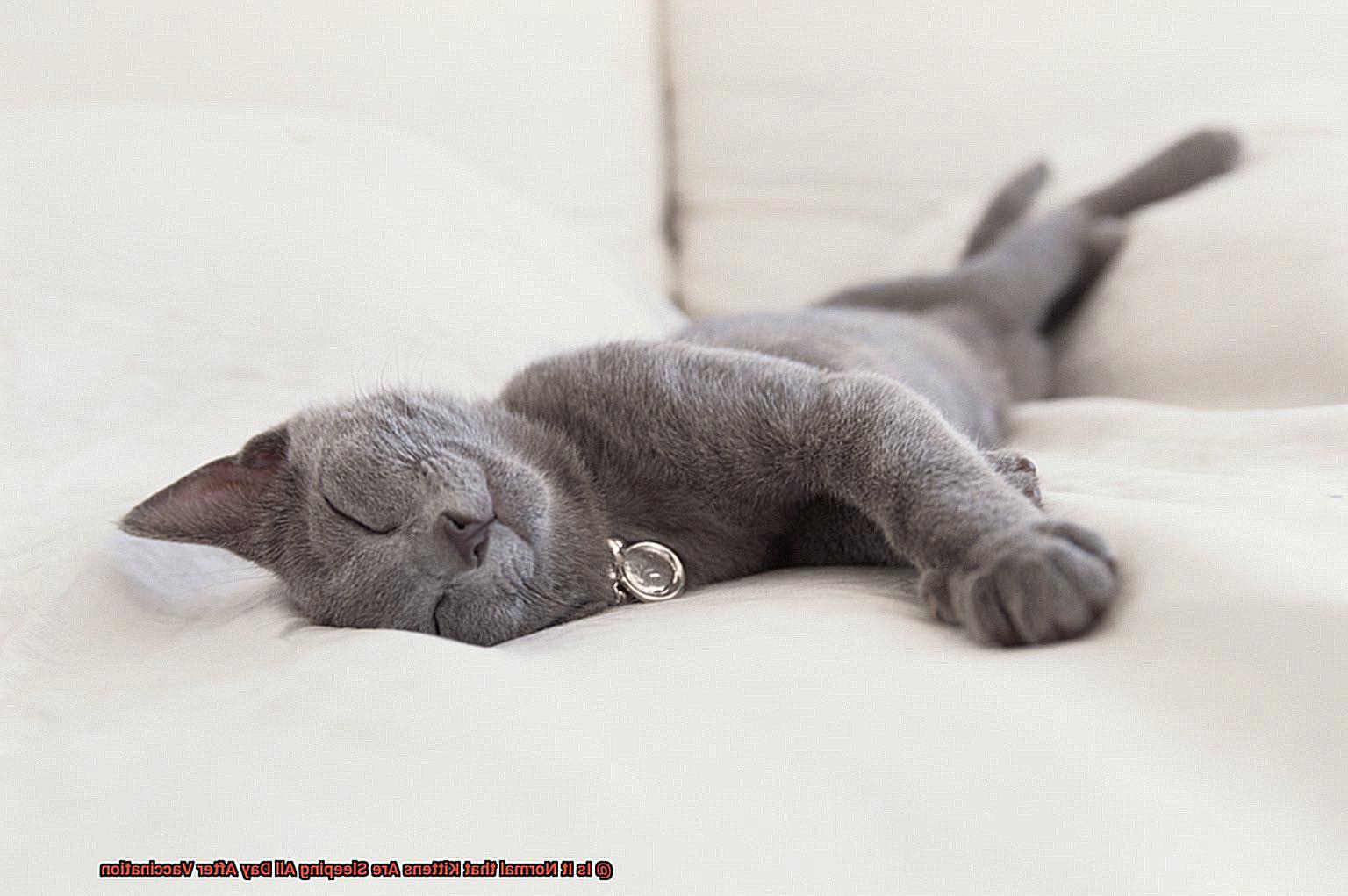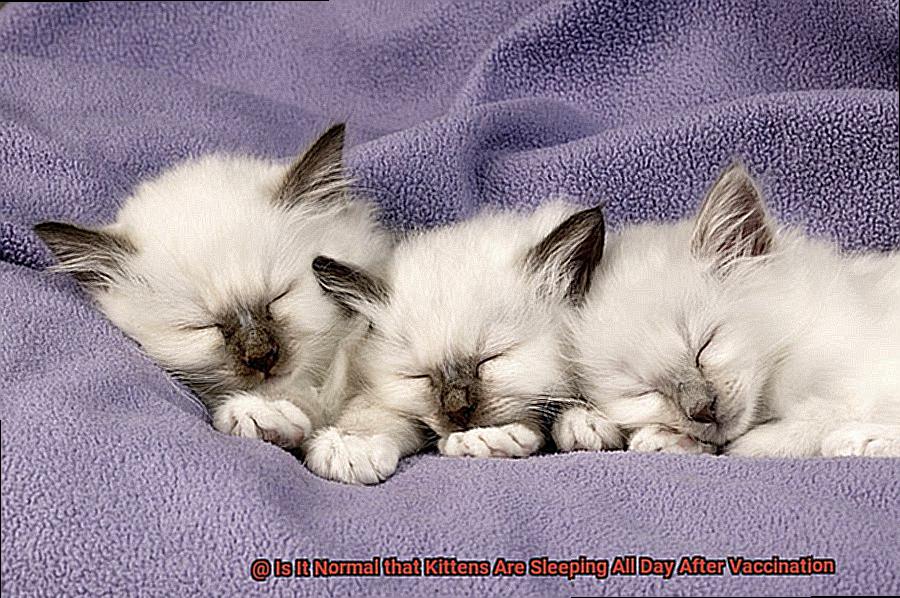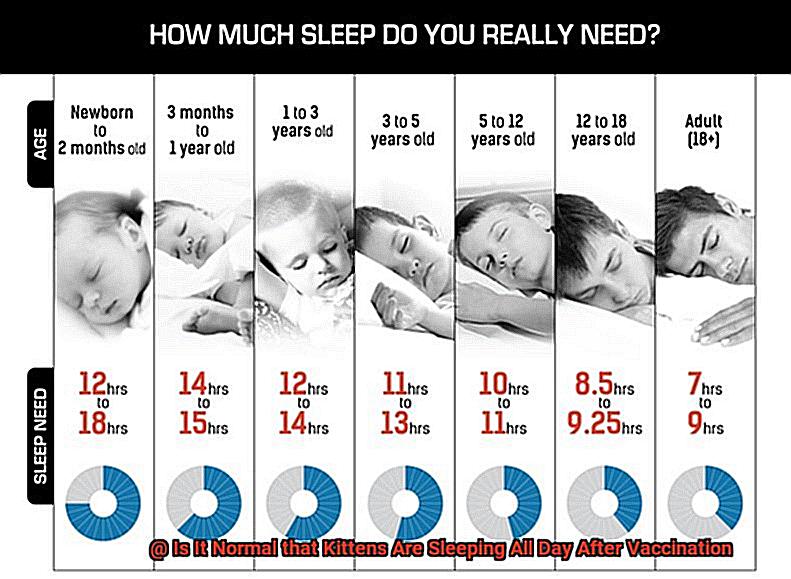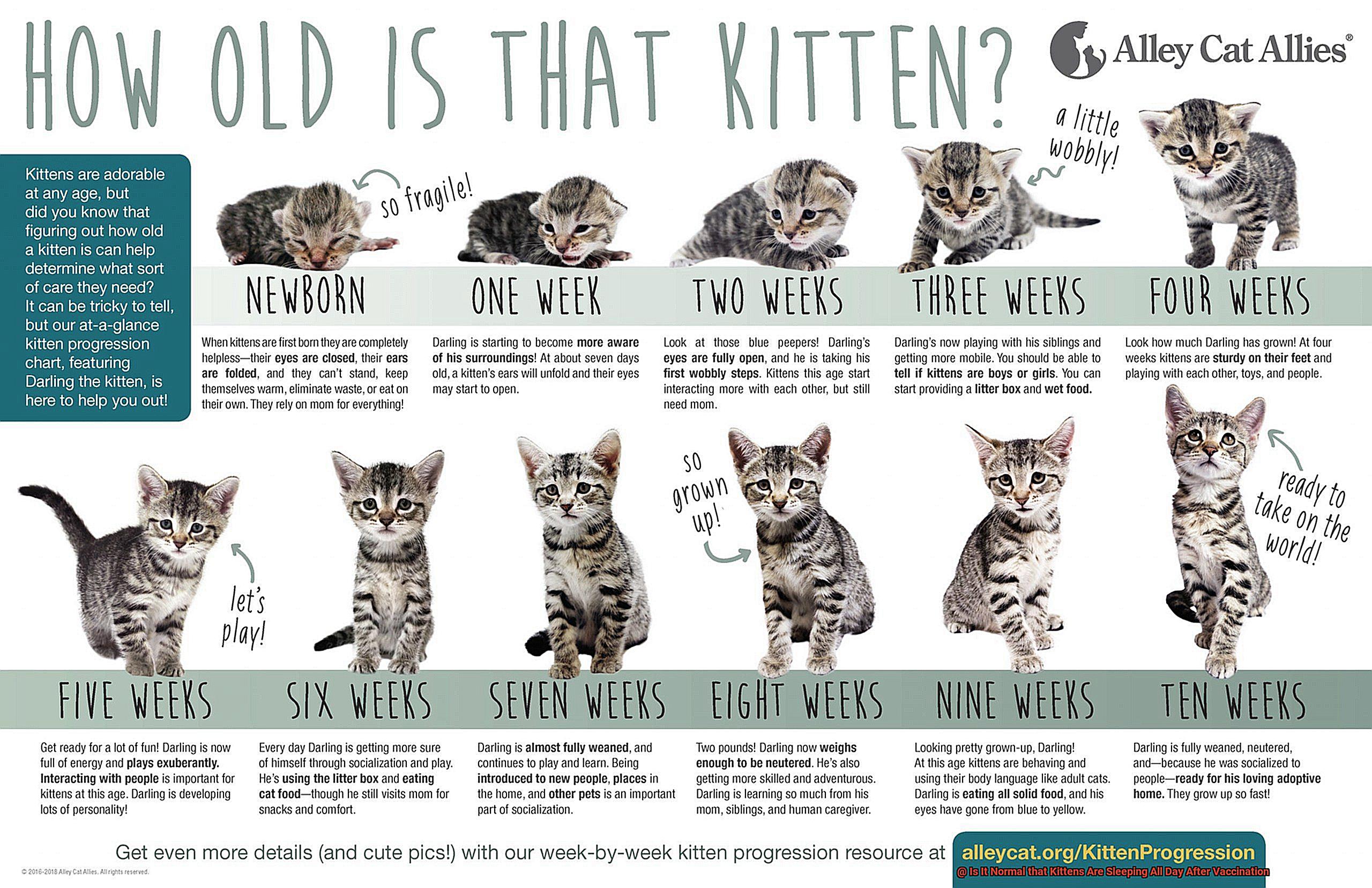Are you a new kitten parent feeling concerned about your little one’s sleeping habits after vaccination? You’re not alone. Vaccinating your kitten is vital to safeguard them from fatal illnesses, but it’s natural to notice any changes in their behavior afterwards. One common observation among cat owners is that kittens tend to sleep all day after vaccination. But should you be worried, or is this normal?
In this blog post, we’ll explore the reasons behind this peculiar behavior and help you understand whether it’s typical or not. We’ll begin by examining the vaccination process and what happens to your kitten’s immune system during the procedure. Then, we’ll delve into the reasons behind the lethargy, sleepiness, and loss of appetite that are often observed post-vaccination.

We’ll also address potential complications that may arise from vaccinations and when it’s necessary to seek veterinary care. Finally, we’ll provide you with some tips on how to take care of your kitten after vaccination and aid in their speedy recovery.
So let’s dive right in. By the end of this post, you’ll have a better understanding of your kitten’s sleeping patterns post-vaccination and know what to expect moving forward.
What Causes Kittens to Sleep More After Vaccination?
Vaccines are a vital part of preventing infectious diseases, but they can come with some side effects. One of the most common is fatigue, especially in young kittens whose immune systems are still developing. Think of it like a boot camp training- after an intense workout, your muscles need rest and recovery time. Similarly, after receiving a vaccine, your kitten’s immune system needs time to recover and build up its defenses against the specific disease targeted by the vaccine.
Furthermore, vaccines can cause mild inflammation at the injection site. The inflammation is a normal response and usually resolves within a few days. However, it can also contribute to your kitten’s overall feeling of lethargy and sleepiness.
Now, don’t fret- your kitten’s excessive sleeping is usually nothing to worry about. However, if you notice any other concerning symptoms or if their drowsiness lasts for an extended period, it’s best to consult with a veterinarian to rule out any underlying health issues.
In the meantime, there are things you can do to help your kitten feel better and sleep through their recovery period. Make sure they have a cozy space to rest in with plenty of blankets and pillows for them to snuggle up in. Provide them with fresh water and food nearby so they can refuel without having to move around too much. And lastly, limit their activity during this time- while they may be feeling better soon, they still need time to rest and recover.
How to Monitor Your Kitten’s Behavior After Vaccination

While vaccines are crucial for protecting your kitten against dangerous diseases, they can also cause some side effects. In this blog post, we’ll explore how to monitor your kitten’s behavior after vaccination and provide helpful tips to help them recover quickly.

Signs to Watch Out For After Vaccination
After your kitten receives their vaccinations, it’s crucial to keep an eye out for any concerning symptoms or side effects. While it’s normal for kittens to feel a little sleepy and lethargic after getting their shots, there are certain red flags to watch out for.

These include vomiting, diarrhea, loss of appetite, or difficulty breathing. If you notice any of these symptoms, it’s important to contact your veterinarian right away.
They can provide guidance on how to manage any symptoms and determine if any further medical attention is necessary.
Occasionally, kittens can develop a fever after receiving their vaccines. This can lead to additional symptoms such as vomiting or diarrhea. To monitor your kitten’s temperature, use a thermometer to take their temperature rectally. If it exceeds 103°F (39.5°C), contact your veterinarian for further advice.
Tips for Helping a Kitten Feel Better After Vaccination
Don’t worry, this is a common side effect. However, as a responsible pet parent, you can take steps to help your kitten feel better and recover quickly. Here are some tips for helping your kitten feel better after vaccination:
Provide Comfort and Warmth
Your kitten may need some extra warmth and comfort after receiving their vaccinations. Create a cozy and comfortable spot for them to rest, such as a soft bed or blanket in a quiet area of your home. You can also use a heating pad or hot water bottle to provide extra warmth.
Encourage Hydration
It’s essential to keep your kitten hydrated after vaccination. Offer them fresh water in a clean bowl and add some low-sodium chicken broth or tuna juice to make it more appealing. Wet food is also an excellent option as it will help them stay hydrated and nourished.
Offer Soft Food
If your kitten is not eating well after vaccination, try offering them soft and easy-to-digest food such as canned cat food or cooked chicken or fish. Avoid giving them dry kibble as it may be too hard for them to chew and digest.

Monitor Your Kitten’s Condition
Keep a close eye on your kitten’s behavior and look out for any signs of discomfort or pain. If you notice anything unusual, such as persistent vomiting or diarrhea, contact your veterinarian immediately.
Give Extra Love and Attention
During this time, your kitten may need some extra love and attention. Petting and playing with them can help boost their mood and alleviate any anxiety they might be feeling.
In conclusion, by following these tips, you can help your kitten feel more comfortable and recover quickly after vaccination. Remember, it’s normal for kittens to feel sleepy after vaccination, but if you have any concerns about your kitten’s health, don’t hesitate to seek professional advice from your veterinarian.
How Long Do Cat Vaccine Side Effects Last?
But, it’s essential to be aware of the potential side effects that come with it. So, how long do cat vaccine side effects last? And what can you do to make your cat feel better?
Firstly, it’s crucial to understand that cat vaccine side effects are generally mild and short-lived. These side effects can include lethargy, loss of appetite, fever, and swelling at the injection site. In rare cases, your cat may experience vomiting or diarrhea. These symptoms usually disappear within a few hours or up to 48 hours after vaccination.
However, you should closely monitor your cat’s behavior after vaccination and observe for any lingering symptoms that may last up to a week. If your cat continues to show discomfort or severe symptoms beyond this timeframe, contact your veterinarian immediately.
To help your cat feel more comfortable during this time, provide them with plenty of rest and relaxation. Make sure they have access to fresh water and food but don’t force them to eat if they don’t feel like it.
Offering your feline friend some extra love and attention can also help them feel more secure during this time.
While cat vaccine side effects may cause temporary discomfort for your pet, they are generally mild and short-lived. By monitoring their behavior closely and providing them with extra care, you can help ensure that they recover quickly and comfortably after vaccination.
What Should You Do If Your Kitten Is Unwell After Vaccination?
Don’t worry, here are some simple yet effective steps to get them back to their playful selves.

Firstly, keep a watchful eye on your kitten’s behavior. Are they sleeping more than usual or acting lethargic? If so, provide them with plenty of rest and hydration. Check their food and water intake too. If they’re not eating or drinking, contact your veterinarian immediately.
Mild side effects like soreness at the injection site or a slight fever are common and usually go away on their own within a few days. But if your kitten is experiencing severe symptoms like vomiting or diarrhea, don’t wait – seek veterinary care right away.
Make your furry friend feel comfortable by providing them with a warm and cozy spot to rest in. They may also appreciate some extra attention and cuddles from you during this time of recovery.
Remember that if your kitten still isn’t feeling well after a week, it’s best to consult with your vet. They may want to check for any underlying health issues that could be causing the symptoms.
To sum it up, keep an eye on your kitten’s behavior and eating habits, give them a cozy resting place, and don’t hesitate to seek veterinary care when needed.
Common Signs and Symptoms of a Sick Kitten After Vaccination
Vaccinations are an excellent way to safeguard your kitten against dangerous diseases and illnesses. However, it’s essential to know what to expect after your furry companion receives their vaccination.
It’s common for kittens to feel drowsy after getting vaccinated. They may snooze more than usual, but if they’re sleeping excessively throughout the day, it could be a sign that they’re not feeling well.
Keep an eye out for other symptoms like vomiting, diarrhea, loss of appetite, and lethargy. If you notice any of these signs, don’t hesitate to contact your veterinarian immediately.
Your veterinarian may recommend administering mild pain relievers or anti-inflammatory medication to alleviate any discomfort your kitten may be experiencing. They may also suggest creating a calm and peaceful environment for your kitten to rest and recover.
It’s crucial to take any severe or persistent symptoms seriously and seek veterinary care immediately. While some side effects from vaccinations are normal, it’s always better to err on the side of caution.
By keeping a close eye on your kitten after their vaccination and seeking prompt medical attention if necessary, you can ensure that your furry companion remains healthy and happy.
To sum up, vaccinations are a vital aspect of maintaining your kitten’s well-being. Being aware of the potential side effects and monitoring your kitten closely afterward are essential steps in ensuring their health and happiness.
Provide a comfortable environment for them to rest in and act fast by contacting your veterinarian if you notice any concerning symptoms.
When to Contact Your Veterinarian About Your Kitten’s Sleepiness After Vaccines
Vaccinating your kitten is an essential step in safeguarding them from life-threatening diseases, but it’s crucial to understand what to expect afterwards.
After vaccinations, it’s common for kittens to feel a bit lethargic and sleep more than usual. However, if your kitten is experiencing excessive sleepiness or other symptoms like vomiting, diarrhea, or loss of appetite, it’s vital to contact your veterinarian right away. These symptoms could be a sign of an adverse reaction to the vaccine or an underlying health issue that needs to be addressed.
Think of vaccines as a protective shield that shields your kitten against deadly diseases. But just like a shield can become weakened after being used in battle, vaccines can also have side effects.
Mild side effects such as a low-grade fever or soreness at the injection site are normal and should resolve within a day or two. However, if your kitten is experiencing more severe symptoms or if the symptoms persist for more than a few days, it’s essential to seek veterinary care.
If you have any concerns about your kitten’s well-being after vaccinations, don’t hesitate to contact your veterinarian. They can help you determine whether the symptoms are normal or if there is a more serious underlying issue that needs attention.
In conclusion, vaccinating your kitten is critical for their health and wellbeing. Still, it’s equally essential to recognize potential side effects and take action if necessary.
So remember, if your kitten is exhibiting abnormal sleepiness or other concerning symptoms after vaccines, contact your veterinarian immediately.
How to Prevent Side Effects from Occurring in the Future
Vaccinations are an essential part of this protection, but they can also cause side effects in your kitten. Here are five steps you can take to prevent side effects from occurring in the future.
Schedule Vaccinations When Your Kitten is Healthy
Just like humans, kittens can get sick too. It’s essential to schedule vaccinations when your kitten is healthy and not experiencing any illnesses or infections. This will reduce the risk of adverse reactions and ensure the vaccine is as effective as possible.
Discuss Any Concerns or Potential Risks with Your Veterinarian
Before the vaccination appointment, discuss any concerns or potential risks with your veterinarian. They may recommend additional precautions to minimize the risk of side effects. Don’t be afraid to ask questions and seek guidance.
Ensure Proper Nutrition and Hydration
Ensure that your kitten receives proper nutrition and hydration before and after their vaccinations. This can help boost their immune system and reduce the likelihood of adverse reactions. A well-fed and hydrated kitten is a happy and healthy one.
Provide a Calm Environment for Your Kitten After Vaccination
After vaccinations, provide a quiet and calm environment for your kitten to rest in. Avoid any strenuous activity or playtime for at least 24 hours after the vaccination appointment. Just like how we need rest after a long day, our kittens need time to recover too.
Monitor Your Kitten Closely After Vaccination
Monitor your kitten closely after vaccination for any signs of illness or discomfort, such as lethargy or loss of appetite. If you notice any unusual symptoms, contact your veterinarian immediately. Remember, early intervention can prevent more severe complications down the line.
dCfRE96HfEU” >
Conclusion
In conclusion, it’s perfectly normal for your kitten to sleep all day after vaccination.
Vaccines are crucial in protecting your furry friend from deadly diseases, but they can also have side effects such as lethargy, drowsiness, and loss of appetite. These symptoms usually go away within a few days with proper care and rest.
It’s essential to keep a close eye on your kitten’s behavior after vaccination and watch out for any alarming symptoms or side effects like vomiting, diarrhea, or difficulty breathing. If you notice any of these signs, don’t hesitate to consult with a veterinarian to rule out any underlying health issues.
To make your kitten feel better during their recovery period, create a cozy space for them to rest in with plenty of blankets and pillows.
Make sure they have access to fresh water and food nearby so they can refuel without having to move around too much.
And most importantly, limit their activity during this time so that they can rest and recover properly.







